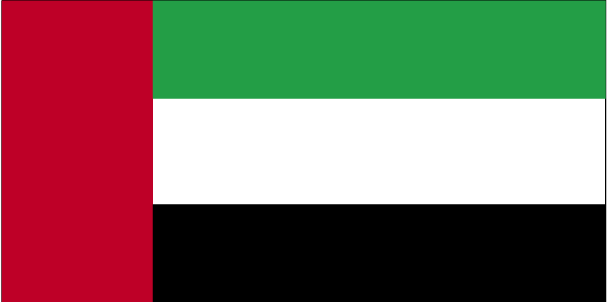Opposition groups
|
|

|
Polity:
Federation of traditional monarchies
|
Political Rights:
6 |
|
Civil Liberties:
5 |
|
Status:
Not Free |
|
Economy:
Capitalist-statist |
|
Population:
3,500,000 |
|
PPP:
$17,935 |
|
Life Expectancy:
74 |
|
Religious Groups:
Muslim (96 percent) [Shi’a (16 percent)], other |
|
Ethnic Groups: Emirian (19 percent), other Arab and Iranian (23
percent), South Asian (50 percent), European and East Asian (8
percent) |
|
Capital:
Abu Dhabi |
|
Ten Year Ratings
Timeline (Political Rights, Civil Liberties, Status):
|
|
1993
|
1994
|
1995
|
1996
|
1997
|
1998
|
1999
|
2000
|
2001
|
2002
|
2003
|
|
6,5,NF
|
7,5,NF
|
6,5,NF
|
6,5,NF
|
6,5,NF
|
6,5,NF
|
6,5,NF
|
6,5,NF
|
6,5,NF
|
6,5,NF
|
6,5,NF
|
Brief Overview
While the ruling families of the United Arab Emirates (UAE)
make little pretense of respecting the political and civil liberties of
their subjects, they have managed to minimize the legal capriciousness
normally associated with autocratic rule in the Middle East and have built
the region's most vibrant, diversified economy. However, revelations that
much of the financing for the September 11, 2001, attacks on the Unites
States passed through the UAE reinforced the supposition that the country
remains a key financial hub of international terrorism. The government
enacted stringent anti-money- laundering laws and other regulatory reforms
in 2002.
Political Rights and Civil Liberties
Citizens of the UAE cannot change their government democratically. The
seven dynastic rulers of the emirates collectively constitute the Federal
Supreme Council (FSC), which selects the president and vice president
every five years and ratifies federal legislation. The president appoints
the prime minister and cabinet. The 40-member Federal National Council (Majlis
al-Ittihad al-Watani), composed of delegates appointed by the seven
rulers, serves as an advisory body but has no legislative authority. There
are no elections at any level, and political parties are illegal.
Although the constitution prohibits arbitrary arrest, UAE laws permit
incommunicado detention if police believe that communication between a
suspect and third parties may compromise an ongoing investigation.
Suspects in police custody can be detained without charge indefinitely
upon court order and are not entitled to legal counsel until an
investigation is completed. Torture and death in police custody are
reportedly rare, though governmental claims that the death of a Libyan
national under arrest in September 2001 resulted from suicide have been
questioned by Amnesty International.
The judiciary is not independent, as most judges are foreign nationals
appointed to renewable terms and court rulings are subject to review by
the political leadership. The judicial system comprises both Sharia
(Islamic law) and secular courts. There are no jury trials, but due
process protections exist. Sharia allows for corporal punishment for such
crimes as adultery, prostitution, and drug or alcohol abuse. Drug
trafficking is a capital offense, though executions are rare.
Freedom of expression is protected under the constitution, but strictly
limited in practice. Broadcast media are almost entirely state owned and
adhere to official guidelines. Journalists and academics exercise
self-censorship regarding governmental policy, national security, and
religion. Most print publications are privately owned, but receive
government subsidies and often publish verbatim articles from the
state-run Emirates News Agency. Foreign publications are censored, though
satellite dishes are widely owned and provide access to uncensored foreign
broadcasting. The state maintains a monopoly on Internet service and
blocks access to radical Islamic Web sites.
The government limits freedom of assembly and association. Permits are
required for organized public gatherings and are rarely granted, though
enforcement varies from emirate to emirate. Informal political discussion
forums held in private homes are tolerated. All nongovernmental
organizations (NGOs) must be registered by the government. While a number
of unregistered groups operate openly, there are no independent human
rights groups.
Trade unions, strikes, and collective bargaining are illegal. Foreign
nationals, who make up a staggering 98 percent of the private workforce,
are subject to abuse and nonpayment of wages by employers. While labor law
offers some protection, most abuse goes unreported. In June 2002, the UAE
press reported that an Asian worker died and 15 fell ill at a labor camp ,
where workers lived in sweltering heat without water or electricity for
several days because their Dubai-based employer had not paid the utility
bills. In September, the government criminalized the hiring of camel
jockeys under the age of 15.
Islam is the official religion of the UAE, where 85 percent of citizens
are Sunni Muslim and 15 percent are Shiite Muslim. The vast majority of
Sunni mosques receive substantial government funding, while all Sunni
imams are employees of either federal or local government and do not
deviate from approved topics in their sermons. While Shiite mosques
operate independently of the government, they also adhere to government
guidelines. Non-Muslims, mostly foreign nationals, may practice freely but
may not proselytize or distribute religious literature. Although Christian
churches and schools are widespread, there are no Buddhist temples and
only one Hindu temple in the UAE.
|
